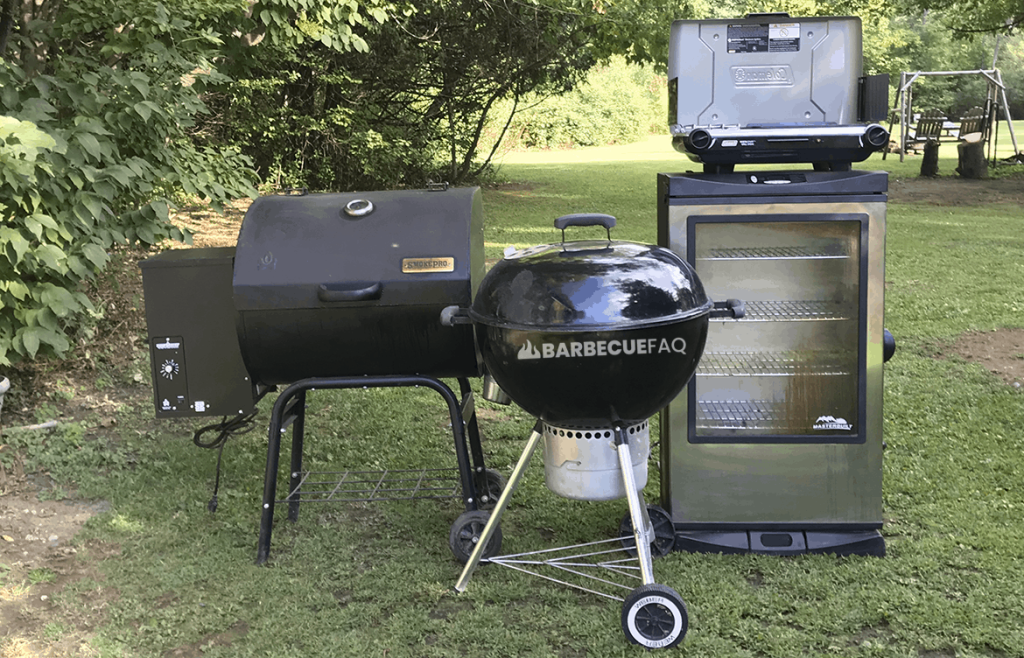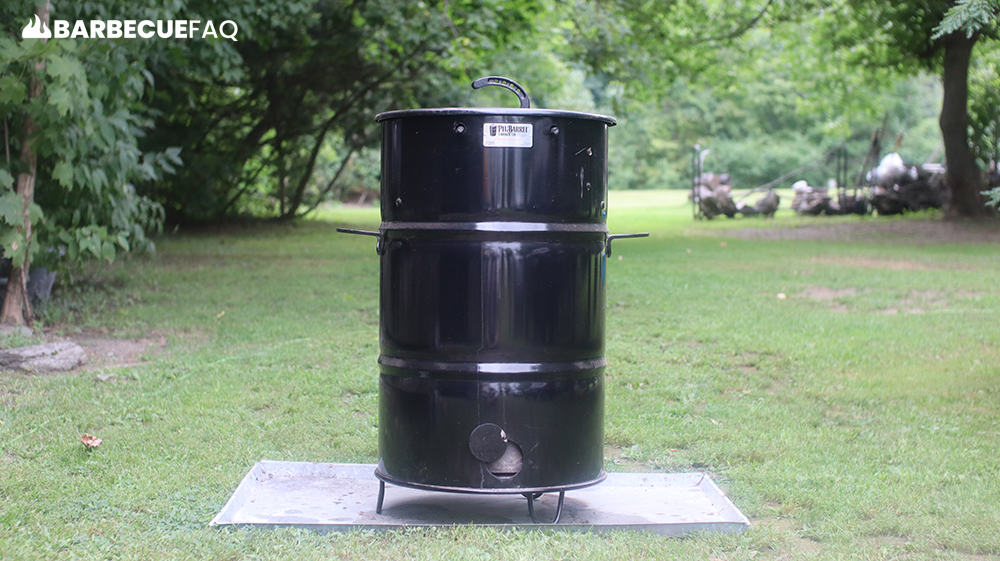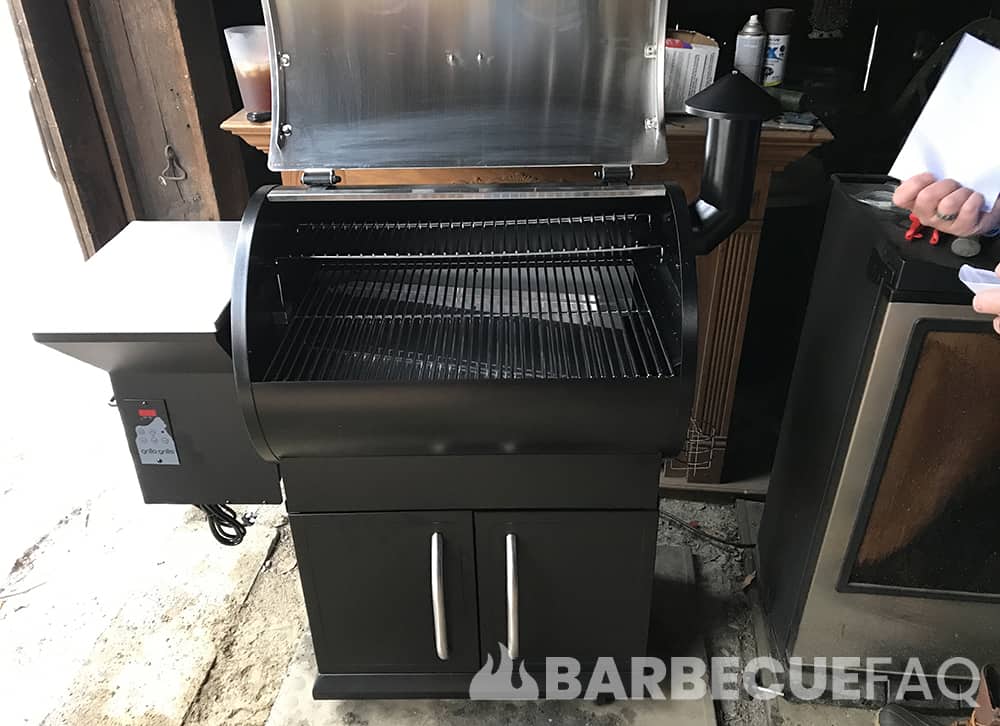To Preface: A lot of other barbecue websites exist to monetize your click to make money.
Meaning, they have no problems recommending inferior products. For the folks who read this article, I went ahead and bought a few of these so YOU don’t have to.
My goal with this article is to give you “the skinny” on grill brushes because several fancy marketing gimmicks and overpriced products exist in this category of barbecue.
These are my personal thoughts, opinions, and experiences – Your experiences may vary.
1. The Best are the Generic, Plastic-Handled, Wire-Bristled Grill Brushes
Honestly, any wire grill brush brand is likely going to be the cheapest option.
Typically I’ll buy these at my local Home Depot or Runnings (farming and outdoor goods store).

They range in price from $6 – 11 and they’ll last around 4-12 months depending on how often you grill or smoke meat.
Usually I’ll go with whatever is cheapest.
For instance, the grill brush above is from Target and I paid $7.99 at the store
As of writing this article, it’s $5 online. – It’s now $3, but out of stock.
Similarly, here’s a $0.97 grill brush found on Walmart’s website.
My Grandfather had this old wire brush in his Garage:

My Grandmother gave me it when he passed.
In terms of ability to clean your grill grates – bristle brushes do a FAR better job than most bristle-free brushes.

In this category specifically, I also completely avoid using plastic bristle brushes.
For lack of a better word, they suck.
Not to mention, the number of people I’ve seen burn their bristles is too many to count.
You’d think it’d be common sense that plastic melts, but I digress.
They also perform significantly worse than wire bristles. I’m from New England and when it’s cold, these nylon plastic bristles are borderline useless.
The “Loose Bristles” thing with Metal Wire Brushes
The biggest reason people avoid using metal wire bristled brushes is because they claim they don’t want to get metal bristles in their food.
To that I say: What?
I’ve been grilling and smoking food for almost 17 years at this point. Never, and I mean ever, have I had wires from any of my brushes end up in my food.

Maybe these folks received a product that was broken or damaged and the bristles fell out?
I’m not entirely sure but I’ve quite literally never had this happen.
When asking my Father, he said the same thing – never in his 45+ years of grilling has he had that happen.
However, if that’s been an issue for you in the past, use a bristle free grill brush (below).
People are quick to virtue signal that bristle brushes = bad.
But if that’s your standard for risk, then by that logic, you probably shouldn’t grill at all.
I mean we can look at statistics for things like grill-related burns and house fires and the frequency of these things happening is much higher in comparison to ER visits that involve the ingestion of a bristle from a grill brush.
But I’d encourage you – the reader – to lookup the actual numbers. I know I have.
2. Brushtech Bristle Free Grill Brush
My Brother got me this grill brush from Homeport in Vermont.

I’d seen these around but never bought one because, again, all I care about is price.
These are usually around $5-6 more than a wire bristled brush.
The biggest allure here is that it’s bristle free. So if you’re someone who is wary of bristles showing up in your food – bristle free brushes help avoid that problem.

In my opinion, these brushes tend to perform much worse than bristle brushes.
They generally do an OK job of getting debris and carbon deposits off the top of your grates but not as well as bristle brushes which sort of mold and contort to your grates.
Meaning they suck at getting debris from the sides.
I will say, if you’re someone who wants a grill brush they can “clean,” this is probably a good option. Mainly because it’s nearly impossible to get debris/carbon deposits out of wire bristles; Especially when it’s been caked on for several months.
The way this brush is made, you could easily soak the metal end in a solution of warm soapy water.
With these style of brushes you’re essentially getting a product that cleans worse than bristle-style brushes and costs a tad bit more.
Sounds like a lose lose to me.
3. Chainmail and “Rail Cleaner Tools”
I’ve never owned a chainmail brush but I’ve had several chainmail sponges come with cast iron pans; Bought separately they’re like ~$20-30.
Even those I don’t use to clean my cast iron – I just use salt.
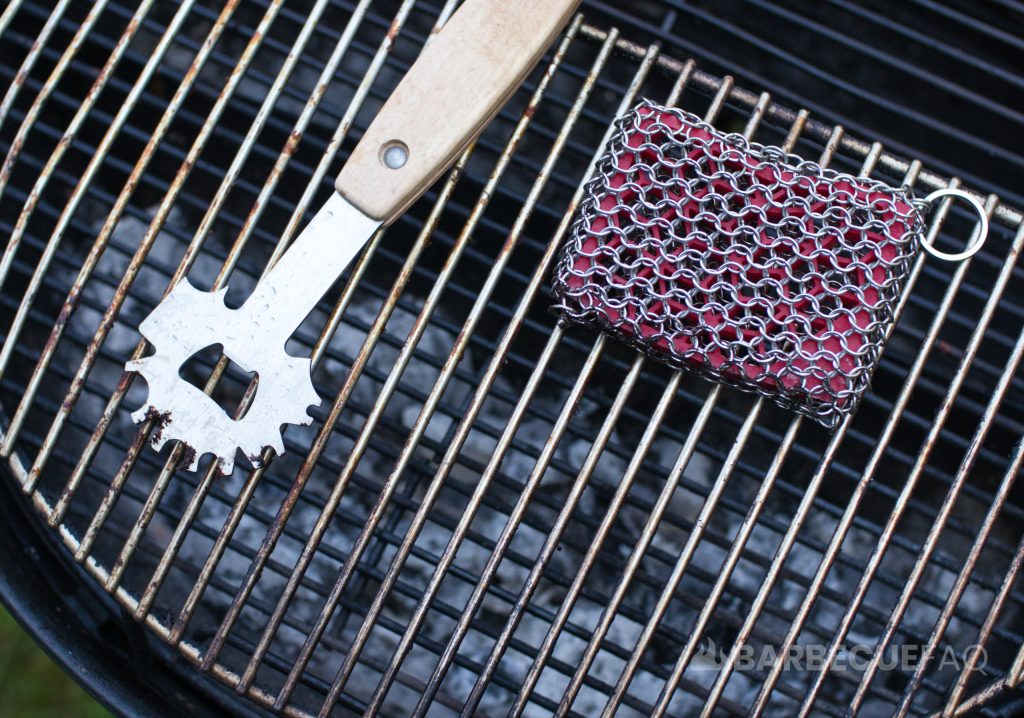
I’ve used them before to clean my grill grates when COLD and they work OK. Often the debris on the sides still doesn’t come off great but for all intents and purposes, they work.
They’re dishwasher safe which is cool since the “sponge” material is silicone and the steel is stainless steel.
The chainmail also is pretty durable; I’ve only ever broken 1 of the many I have.
Smarter Every Day’s Chainmail Brush: The efforts to make a product in the USA are valiant; But the price is staggering for a grill brush.
If you’re into supporting USA made products and don’t mind the longer lead time (these are currently on pre-order) – consider checking it out.
I personally won’t be purchasing.
Grill Rail Cleaner Tools
These are handled tools often made of wood + metal. They’re often pretty cheap – I’ve gotten a few as stocking stuffers over the years (one of mine pictured above).
I think they work OK-ish but I also almost never reach for one.
Can you guess why? My cheap $0.97 wire bristled brush has them on either side and they work just as well as these tools.
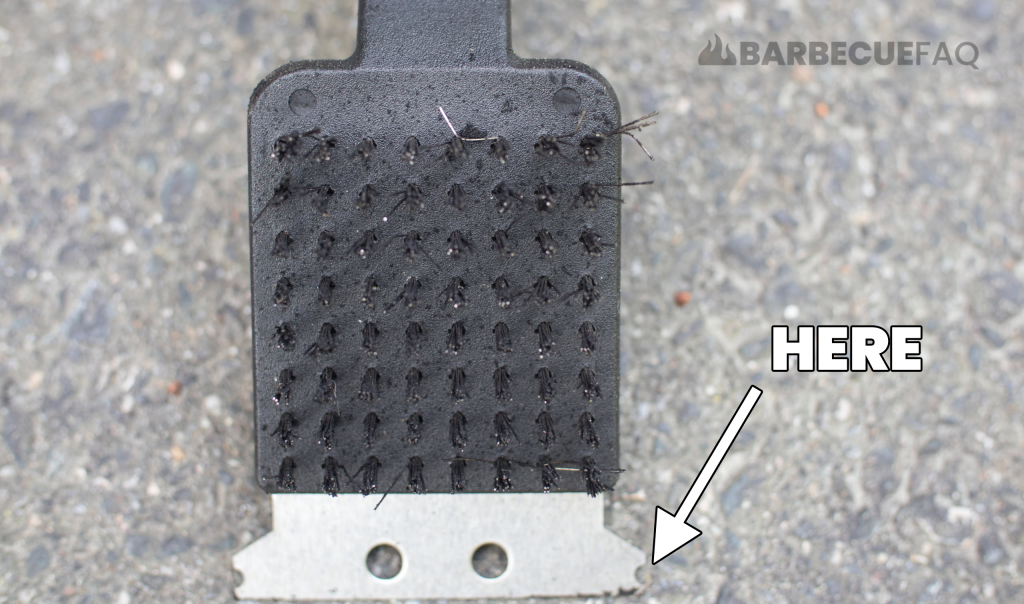
They’re like the tools in your kitchen that you throw into that one drawer and forget about.
They can range in price form like $3 to $50. The longer-handled ones being the more expensive that sort of wrap around your grill rails.
The ones I’ve owned have different sized cut-outs to attempt to fit all different types of grate sizes.
But it’s like in doing so they make them all stink vs having 1 cut-out actually work – like a Jack of all Trades but master of none.
Instead, my $0.97 just works.
4. Barbi-Q Grill Cleaning Bricks
When writing this article, I remembered that I also deep clean my grill grates with grill cleaning bricks once a year – you can read my deep cleaning article, by clicking here.
If you don’t do regular deep grill cleaning yearly, I’d strongly urge you to do so; Your grills will last like 10x longer.

They’re pretty cheap at ~$8-12 for 3 bricks.
To me, they’re like a rebranded/repurposed pumice stone that folks might use to remove dead-skin from their feet.
The stone conforms to the shape of your grill grates or whatever shape of “rail” your grates use. Meaning, you get more surface contact on your grates.
This is pictured below:

If I’m doing a deep clean – like in the photo above – these tend to work quite well.
However, for regular cleaning, I’d much rather grab my wire bristled brush or bristle free brush and use that to quickly remove debris.
As I hope is readily apparent from my deep cleaning photo above, these stones will leave a ton of residue from the stone itself. This is the main reason I’d likely never use these to clean my grill grates for routine cleaning.
It’s almost like you’re having to clean your grill grates and then you have to clean them again to remove the residue/dust.
The material is also quite abrasive.
For me – they’re cheap and work well. The amount of residue from using them is rather off-putting but they do work wonderfully for a deep clean.
5. The Grill Rescue BBQ Brush with Scraper
I feel like this article wouldn’t be complete without me bringing up the Grill Rescue brush. I actually opted to buy this from Amazon just for the sake of this review.
Of the options out there, this is the one the more expensive grill brushes on the market. Typically most grill brushes fall in the range of ~$5-$20.
That’s what I’ve personally seen over the course of a decade of grilling and smoking meat.

I actually held off on posting this article solely because I wanted to test the brush for an extended period of time; I bought the Grill Rescue brush back in August 2022 – it’s now December 2024.
To start, I’d never suggest anyone spend $40-50 on a grill brush. That’s like 3-4 bags of charcoal or 3-4 bags of smoking pellets, with enough left over to buy a cheap grill brush for ~$5.
To be exact, I spent $54.95 on this Grill brush on August 22, 2022.
It’s also important to note that they have an option without the scraper that’s cheaper.
To me, it doesn’t perform markedly better to warrant the higher price point; However, it does work as described by Grill Rescue.
Realistically, after using this brush for 12 months
The only times I reached for it was when I used my Blackstone Flat top or my pellet grill; Both surfaces that get quite hot.
In terms of my Blackstone: A paper towel or old rag, a spatula and some water do the same thing. That’s how I’ve cleaned my Blackstone for years.
In terms of my pellet grill: I’d say it does do a decent job of removing debris. However, I wouldn’t say it’s markedly better than a regular wire-bristled grill brush at the same testing parameters (ie. 400F); I’ve directly compared them and the differences were negligible.
I also think it’s similar to the bristle-free brushes – they suck at getting debris off the sides of grill grates.
Granted, if you’re super concerned with bristles – this is bristle-free so that’s a bonus.
I personally don’t use Gas grills anymore but it’s likely the same story there too.
Apart from these qualms, the plastic handle material does feel high quality; It’s long and heavy so those are bonuses in my book.
During winter in New England, it’s not unrealistic for the cheap plastic handles to snap. Granted, I’d wager to say most folks aren’t like me trying to smoke ribs or brisket when it’s -15F outside.
When that happens, you throw them out and get another for $6-11.
With this grill brush you have to buy a replacement head off of Amazon for ~$14.95 (the one without the scraper) or ~$19.95 (for the one with a scraper).

It’s also worth noting, the “tab” used to remove the head from the grill brush is somewhat hard to push. I’m 6’2″ and 240 lbs, with hands the size of catcher mitts and even I struggled to do so.
Maybe I’m doing it wrong – which is a strong possibility.
I’m specifically referring to these tabs:

Again, your experiences may entirely vary from mine. If you’re someone who only grills things like steak, hot dogs, hamburgers, fish, etc. this brush could be for you.
Now that I’ve owned the brush for 12+ month I’d say it definitely works based on how they describe it. ie. pre-heat to 400F, dunk in water, and then clean your grates.
Taking out a bowl of water isn’t super cumbersome in the grand scheme of things and it does work as described.
But if I’m ever smoking meat, this brush doesn’t work because the grill doesn’t reach those temperatures.
What to Look for in a Grill Brush
Again, in my opinion, all that matters is the price.
Unlike most articles that will go on and on with nuanced explanations of various features like:
- Handle material
- Bristle material
- Method of debris removal – bristles, heat/steam, scraper, etc.
In the grand scheme of things, for what exists on the market, these features don’t really tend to matter much and won’t have a significant enough impact with respect to cleaning grill grates.
All these fancy marketing terms/gimmicks do is increase the price of the product – that’s it.
Grill brushes also aren’t a “lifetime” item – you’re likely going to have to replace at least every year-ish if you grill often.
OH and I didn’t buy the $150 robot to clean my grill – like I said, gimmicks aren’t for me.


